
Miles Ahead is an album by Miles Davis that was released in October 1957 by Columbia Records. It was Davis' first collaboration with arranger Gil Evans following the Birth of the Cool sessions. Along with their subsequent collaborations Porgy and Bess (1959) and Sketches of Spain (1960), Miles Ahead is one of the most famous recordings of Third Stream, a fusion of jazz, European classical, and world musics. Davis played flugelhorn throughout.
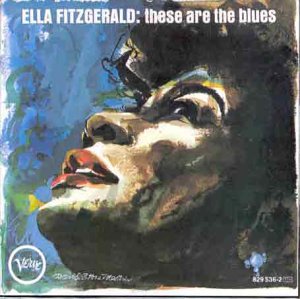
These are the Blues is a 1963 studio album by the American jazz singer Ella Fitzgerald featuring trumpeter Roy Eldridge and organist Wild Bill Davis. Sleeve artwork was painted by David Stone Martin. This is Fitzgerald's only example of recording an entire album of blues songs.

George Mesrop Avakian was an American record producer, artist manager, writer, educator and executive. Best known for his work from 1939 to the early 1960s at Decca Records, Columbia Records, World Pacific Records, Warner Bros. Records, and RCA Records, he was a major force in the expansion and development of the U.S. recording industry. Avakian functioned as an independent producer and manager from the 1960s to the early 2000s and worked with artists such as Louis Armstrong, Miles Davis, Duke Ellington, Benny Goodman, Dave Brubeck, Eddie Condon, Keith Jarrett, Erroll Garner, Buck Clayton, Sonny Rollins, Paul Desmond, Edith Piaf, Bob Newhart, Johnny Mathis, John Cage, Alan Hovhaness, Ravi Shankar, and many other notable jazz musicians and composers.

Life Between the Exit Signs is the first jazz album by pianist Keith Jarrett as a leader. It was recorded on May 4, 1967 at Atlantic Recording Studios, in New York City and released on April 1, 1968, under the record label Vortex, a subsidiary label of Atlantic Records. It is the first session featuring Jarrett, bassist Charlie Haden and drummer Paul Motian together. In 1999, Collectables Records reissued the album paired with Jarrett's El Juicio , and in 2004 Atlantic Records reissued it along with extensive liner notes by Professor Bill Dobbins.
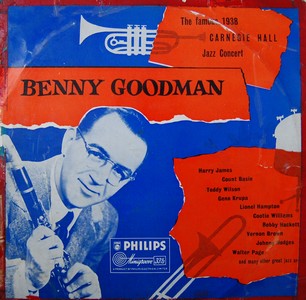
The Famous 1938 Carnegie Hall Jazz Concert by Benny Goodman, Columbia Records catalogue item SL-160, is a two-disc LP of swing and jazz music recorded at Carnegie Hall in New York City on January 16, 1938. First issued in 1950, the landmark recording captured the premiere performance given by a big band in the famed concert venue. The event has been described as "the single most important jazz or popular music concert in history: jazz's 'coming out' party to the world of 'respectable' music."

Sarah Vaughan, reissued in 1991 as Sarah Vaughan with Clifford Brown, is a 1955 jazz album featuring singer Sarah Vaughan and trumpeter Clifford Brown, released on the EmArcy label. It was the only collaboration between the two musicians. Well received, though not without some criticism, the album was Vaughan's own favorite among her works through 1980. The album was inducted into the Grammy Hall of Fame in 1999.
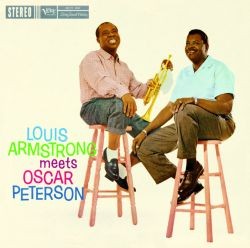
Louis Armstrong Meets Oscar Peterson is a 1959 studio album by Louis Armstrong, accompanied by Oscar Peterson.

Have Trumpet, Will Excite! is a 1959 studio album by trumpeter Dizzy Gillespie.

Back to Back is a 1959 studio album by Johnny Hodges and Duke Ellington. It was followed by Side by Side (1959), recorded at the same sessions.
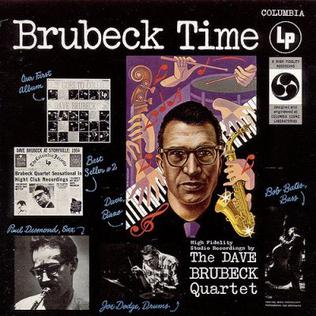
Brubeck Time is a jazz album by The Dave Brubeck Quartet, a rare studio recording from that period of the band, when it was recording mostly live albums. It was recorded in the fall of 1954, and originally released in 1955 under the Columbia label as CL 622. In 1968, Columbia re-channeled the album for stereo and re-released it as Instant Brubeck under the Harmony label as HS 11253. It was later re-released again on CD in 1991 under the title Interchanges '54 as CK 47032, with the addition of four tracks from Jazz: Red Hot and Cool.

Blues in Orbit is an album by American pianist, composer and bandleader Duke Ellington recorded for the Columbia label in 1959 and released in 1960.

Live at Newport '58 is a live album by jazz pianist Horace Silver. The album was recorded on July 6, 1958 at the Newport Jazz Festival. Blue Note Records released the album in 2008. It is one of the few officially released live albums with Silver as bandleader.
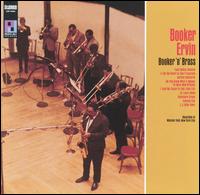
Booker 'n' Brass is an album by American jazz saxophonist Booker Ervin featuring performances recorded in 1967 for the Pacific Jazz label.
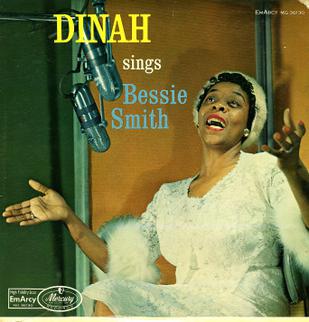
Dinah Sings Bessie Smith is the ninth studio album by blues, R&B and jazz singer Dinah Washington released on the Emarcy label, and reissued by Verve Records in 1999 as The Bessie Smith Songbook. The album arrangements are headed by Robare Edmondson and Ernie Wilkins, and the songs are associated with American blues singer Bessie Smith. AllMusic details the album in its review as saying: "It was only natural that the "Queen of the Blues" should record songs associated with the "Empress of the Blues." The performances by the septet/octet do not sound like the 1920s and the purposely ricky-tick drumming is insulting, but Dinah Washington sounds quite at home on this music".

Hot Fives & Sevens is a 2000 box set collection of recordings made by American jazz trumpeter and singer Louis Armstrong with his Hot Five, Hot Seven, and other groups between 1925 and 1930. First released on JSP Records on 22 August 2000, the set was subsequently reissued on Definitive in 2001. A four-disc compilation, the set has received a "crown" as an author's pick in The Penguin Guide to Jazz and is also included in the book's "core collection" recommended for jazz fans. Allmusic concurs that it is "beyond indispensable", suggesting that "you can't have a Louis Armstrong collection without this historic set" or "any kind of respectable jazz collection" Alternatively, Ben Ratliff, writing in 2002, preferred Columbia's release The Complete Hot Five and Hot Seven Recordings.
Columbia Jazz Masterpieces was a series of Jazz CD, LP and cassette reissues from Columbia Records which began in 1986. Written inside the blue box used on all the album covers "Digitally Remastered Directly from the Original Analog Tapes." In Europe, the series was known as CBS Jazz Masterpieces, with the reissues being released by CBS Records, until 1991, when the Columbia Jazz Masterpieces title was used on all subsequent releases and represses.
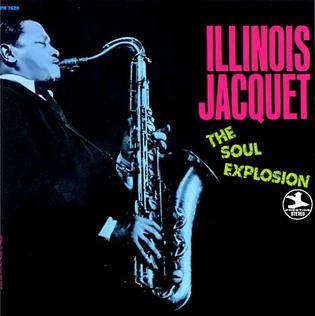
The Soul Explosion is an album by jazz saxophonist Illinois Jacquet which was recorded in 1969 and released on the Prestige label.

Live at the Berlin Philharmonie is a 1970 live album by Dave Brubeck and his trio with Gerry Mulligan recorded at the Berlin Philharmonie. It was reissued in 1995 with several bonus tracks. The album peaked at 21 on the Billboard Top Jazz Charts.
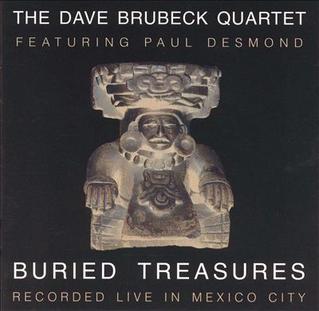
Buried Treasures is a 1967 live album by Dave Brubeck and his quartet, recorded during their tour of Mexico. It was released in 1998. A second live album recorded on their tour, Bravo! Brubeck!, was released in July 1967.

Last of the Whorehouse Piano Players, subtitled The Original Sessions is an album by pianists Ralph Sutton and Jay McShann that was recorded in 1979 and originally released by the Chaz Jazz label as two LPs before being reissued with two additional unreleased tracks by the Chiaroscuro label in 1992. The 1992 CD reissue omitted two tracks from Two Pianos Vol. II, "I'll Catch The Sun" which was a solo feature for Jay McShann and "Ain't Misbehavin'" which Ralph Sutton played solo. Another CD of 1989 recordings by the same group with the same title was released by Chiaroscuro on CD as Last of the Whorehouse Piano Players.



















